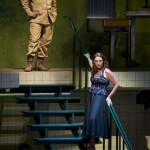By Rebecca Schmid
The title role of Bizet´s Carmen is a milestone for mezzo-sopranos, setting them up for comparison with a pantheon of singers from Maria Callas to Jessye Norman. Magdalena Kozena, well-aware of the challenge, waited until this year to sing in her first fully-staged production, directed by the choreographer Aletta Collins and conducted by her husband, Simon Rattle, at the Salzburg Easter Festival. The premiere was widely criticized, mostly for the reportedly undercooked playing of the Berlin Philharmonic in its last residency before the orchestra packs it bags for a shiny new Easter Festival in Baden-Baden, while Collins and Kozena also had to contend with their share of negative feedback. Die Presse went as far as to call Salzburg native Genia Kühmeier the highlight of the production as the virtuous Michaela, hopelessly in love with the naïve solider Don José as he chases after Carmen.
The opera returned to the roster of the Salzburg Summer Festival (July 20-September 2), this time with the Vienna Philharmonic in the pit at the Grosses Festspielhaus. The ground was not terribly fertile for Kozena´s first entrance, seen August 25, following the onslaught of pseudo-gypsy contemporary dance during the overture, nor did the Czech native convey the sense of danger one associates with the ferocious gypsy. She brought excellent French diction and pliant phrasing to her opening aria “L´amour est enfant de bohème,” but her presence was almost too elegant to believe, nor do Kozena´s low notes have the bite to pull the listener into her seductive destruction. She warmed up a bit more to the role in the second and third acts, expertly playing the castanets in her aria “Là-bas tu me suivrais” in which she beckons José to ride off with her into the sunset, and brought touching vulnerability to the final scene in which José stabs her in a fit of desperate rage.
Jonas Kaufmann is, like Kozena, one of today´s most versatile singers in his Fach and has the star quality to lure audiences in practically any role. His throbbing tenor and steadfast presence made for an amiable José despite a constricted timbre that is not ideal for French repertoire. His single aria “La fleur que tu m´avais jetée” was moving in its earnest execution, although his diction was more understandable in spoken passages. I can´t help but agree with the Austrian press that Kühmeier outshines her more seasoned colleagues in this production. Her words floated effortlessly to the back of the theatre even in soft passages, with a purity of tone and technical control that reveal the greatest respect for Bizet´s lyrical nuances. The American baritone Christian Van Horn also impressed with round, authoritative singing as the lieutenant Zuniga.
Kostas Smorginas was commanding as the toreador Escamillo, José´s rival, despite a gravelly quality to his voice. The German soprano Christina Landshamer revealed fine musicianship in the role of Carmen´s friend, Frasquita, complimented well by Rachel Frenkel at her side as Mercedes. The remainder of the supporting cast similarly made a strong impression. The chorus of the Vienna State Opera lived up to its high musical standards, and the children´s chorus of the Salzburg Festival added some charm to the production. Rattle led the Vienna Philharmonic in an elegant but controlled account of the score, perhaps holding the reins too tight in order to realize his even-textured vision of the music. While the conductor underscored tender moments with great sensitivity, Bizet´s luxurious Romantic phrases did not always breathe idiomatically.
It is of course no easy task to make one´s stamp an opera that counts among today´s most hackneyed stage works. Collins´ production provides a fresh take through her background in dance, setting musical interludes to elegant if flashy contemporary moves and placing an emphasis on the physical interactions between characters, but the effect is more often contrived than revealing. Her direction shies away from the socially subversive qualities that made the opera so scandalous in the late nineteenth century, having Kozena aggressively push away both José and other soldiers ad nauseum while her giving her irresistible eroticism a polite veneer of civility. José murders Carmen tenderly but without the bestiality that blurs the lines between love and hatred, life and death. Sets by Miriam Buether and costumes by Gabrielle Dalton range indecisively between the realist and the post-modern. While the plush, red tavern of Lillas Pastia revealed fine craftsmanship, the oversized masks of the final act seemed desperate to create an original artistic brand. Kozena made a striking last appearance in a burnt orange silk dress and matching flower, perhaps more cover girl than street walker, but a fitting presence for a festival that loves its stars. The audience clapped enthusiastically between numbers and well after I had made my way out of the Festspielhaus.
